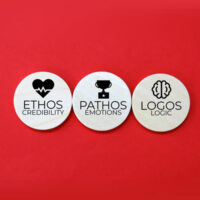Pathos, Logos, Ethos, And Your Criminal Defense Case

When you plead not guilty and your criminal case goes to trial, you are counting on your lawyer being able to persuade the jury that there is reasonable doubt about your guilt. How do lawyers make persuasive arguments? They do not do it by magic. Part of your lawyer’s success takes place before the trial begins. As your lawyer carefully reviews the evidence you plan to present and the evidence the prosecution plans to present, he or she is not only thinking of how the jury should interpret the evidence, but also whether the evidence belongs at trial at all. Many criminal cases have ended in the defendant’s favor because the defense persuaded the judge not to let the jury see a piece of evidence that the prosecution obtained illegally. Lawyers figure out which pieces of evidence are admissible through their thorough knowledge of the law, but it takes more than just knowledge of the law to persuade a jury to acquit a defendant. For that, they must build a rapport with the jury. You need a West Palm Beach criminal defense lawyer who possesses both knowledge of the law and rhetorical skills.
What Are the Classical Rhetorical Appeals, and How Do Lawyers Use Them?
Pathos, logos, ethos, and Kairos are the four rhetorical appeals, according to the philosopher Aristotle. Kairos is the moment in which persuasive speech occurs; by addressing a jury at trial, your lawyer already has that one covered. Pathos is appealing to the jury’s emotions. This is about more than just dramatic pauses in your lawyer’s closing arguments or in summoning witnesses who tearfully describe being falsely accused or otherwise mistreated by the prosecutors or police officers involved in your case. In order to appeal to the jury’s emotions, your lawyer must know how each juror thinks. Juror selection is not just about whether a juror is biased or unbiased; by interviewing the jurors, your lawyer can find out what makes them tick.
Logos is when your lawyer makes logical arguments; this is the most important rhetorical appeal. All the eloquence and rapport in the world will not persuade the jury if, once they get to the deliberation room, they can easily find holes in your arguments. The most persuasive arguments are the ones where the lawyer leaves the conclusion unspoken; the jury is more likely to find the argument convincing if they feel that they are the ones who figured it out.
Ethos is the credibility of a lawyer’s reputation, in other words, looking and sounding like a lawyer. Your lawyer also plays on ethos by summoning expert witnesses who look and sound knowledgeable about their area of expertise, especially when they explain things in terms that are easy for the jury to understand.
Contact a West Palm Beach Criminal Defense Lawyer Today
Attorney William Wallshein has more than 41 years of experience, including five years as a prosecutor in Palm Beach County. Contact William Wallshein P.A. in West Palm Beach, Florida to discuss your case.
Sources:
ncdd.com/top-dui-attorneys-blog/three-keys-to-creating-winning-arguments-pathos-logos-and-ethos#:~:text=How%20do%20we%2C%20as%20attorneys,%2C%20and%20ethos%2C%20can%20help.
law.temple.edu/aer/2022/10/24/persuasion-science-for-trial-lawyers/#:~:text=By%20enticing%20the%20jurors%20to,because%20they%20have%20persuaded%20themselves.
